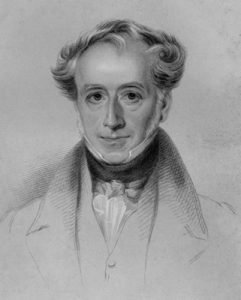


James Montgomery (1771 – 1854)
Repertoire:
Angels from the Realms of Glory
James Montgomery (November 4, 1771 – April 30,1854) was a Scottish-born hymn writer, poet, and editor. He followed in the footsteps of two British hymn writers, Isaac Watts and Charles Wesley. His father was a Minister in the Moravian Church and his hymns are firmly based upon the words he read and was taught from the Bible. When he was 6 years old, his parents moved to the West Indies to serve as Missionaries. He was later to join them but both died within a year of each other shortly after their arrival. He remained in Yorkshire and was raised in the boy’s boarding school established by the Brethren of Fulneck. This school was organized in 1743 by Count Zinzendorf and the Moravians, the same group that influenced John Wesley. Montgomery later said, “There, whatever we did was done in the name and for the sake of Jesus Christ, whom we were taught to regard in the amiable and endearing light of a friend and brother.”
He did not do well in school and a few years later at age 14, he was apprenticed to a baker, then to a storekeeper in a nearby community. His effort included an unsuccessful attempt to launch a literary career as a poet in London. Failing in this, he moved to Sheffield in 1792 and became an assistant to Joseph Gales, an auctioneer, bookseller, and printer of the Sheffield Register. In 1794, Gales emigrated to North Carolina and Montgomery assumed ownership of the paper, changing its name to the Sheffield Iris. He was the sole editor for the next 31 years.
Our hymn, “Angels from the Realms of Glory,” was first published on Christmas Eve, 1816, in the Sheffield Iris. It is considered by many to be one of the best Christmas hymns since it sets forth a logical progression for the true meaning of Christmas. The hymn has a sense of urgency and excitement as it calls all men, even the lowest sinner, to action with the call: “Come and worship.”
Although it sets out the real reason for Christ’s birth, the original fifth stanza is omitted in many modern hymnals since it carries a perceived “negative” message. That being the identification of the unsaved as “sinners” along with identifying their destination. But, it is still an eternally vital message for today:
Sinners, wrung with true repentance,
Doomed for guilt to endless pains,
Justice now revokes your sentence,
Mercy calls you; break your chains . . .
In his hymn, Montgomery reminds us that the Nativity was more than a sweet manger scene. As many texts from both the Old and New Testament remind us, the Birth of Christ was the love of God making itself known to mankind. The author begins in verse 1 by calling our attention to the announcement of Christ’s birth by the angels (Lk. 2:10-14). The angels’ song of celebration at creation refers to the poetic words of Job 38:4-7, where “morning stars” is poetic imagery for the angels, called “the [heavenly] sons of God.” Next, we see a pair of visiting companies come to the Child: the lowly shepherds (verse 2), and the more socially elite magi (verse 3). Then comes another pairing: the saints of God, elevated to sonship through grace (verse 4), and condemned sinners who turn to Christ for salvation (verse 5).
When it was printed in his newspaper on Christmas Eve, 1816, Montgomery called it simply “Nativity.” In later publications he changed the title to “Good Tidings of Great Joy to All People.” Currently, the song takes the opening line as its title.
Source:
A Treasure of Hymns; Amos R. Wells; United Society of Christian Endeavor; 1914
Our Hymn Writers and Their Hymns; Faith Cook; EP Books; 2005
The Gospel In Hymns; Albert Edward Bailey; Charles Scribner’s Sons; New York 1950
The Story of the Hymns and Tunes (Brown & Butterworth); Zondervan Publishing House
